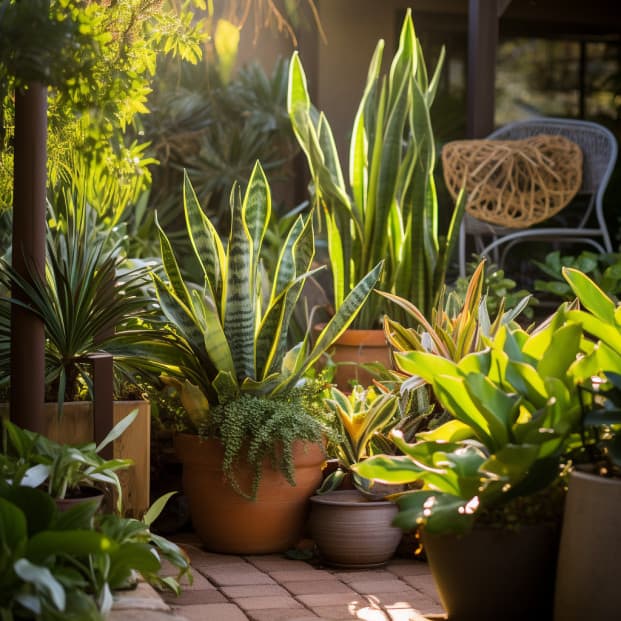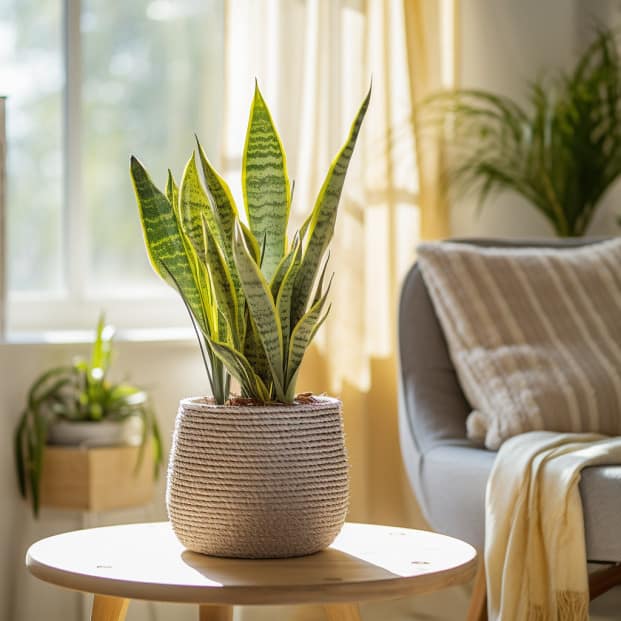Snake plants often stir curiosity about whether they actually attract snakes.
While these resilient plants got their name due to their tall, curved leaves resembling snakeskin, they do not lure real snakes.
This common houseplant deters pests like snakes with its strong, sturdy foliage and natural insecticidal properties.
If you’re wondering whether adding a snake plant invites slithering guests, read on to learn what really attracts snakes and how to design a snake-free oasis using snake plants.
KEY TAKEAWAY
Does snake plant attract snakes?
A snake plant does not attract snakes.snake plant are not known to attract or repel snakes, and they are a common indoor plant choice for their air-purifying properties and low maintenance. (1)
Does a Snake Plant Attract Snake
Snake plants don’t actually attract snakes.
I’ve grown snake plants for over 15 years and have never seen a snake near one.
Their sharp edges and tough leaves make them unappealing to snakes.
Snake plant leaves look a bit like snake skin which has led some to believe they attract snakes.
But snakes are looking for food, not plants that look like them.
Snake plants don’t provide food or shelter for snakes.
One reason snake myths persist is because sometimes you’ll see pests or animals in gardens where snake plants are grown.
But any outdoor plant could have bugs.
It has nothing to do with the plant itself.
Most snake sightings near snake plants are probably coincidences.
Snakes are just exploring gardens like any other outdoor area.
As long as there’s no rodents or insects for them to eat, snakes won’t hang around a snake plant.

I’ve even grown snake plants indoors with no snake issues.
Snakes prefer open spaces to hunt, not the confined area of a pot.
Unless you live in jungle , snake plants pose no snake attraction risk inside or out.
So don’t be scared off great houseplants like snake plants due to myths.
Follow basic safety tips instead, like keeping yards clear of debris.
With proper garden care, you’ll avoid critters without blaming plants.
Snake plants make wonderful low-maintenance greenery for any home or garden.
Snake Plants and Snakes: Background Information
Snake plants do not attract snakes. Their stiff leaves and toxic sap naturally deter pests, including snakes.
Snakes avoid snake plants due to their unappealing look and strong, acrid odor. The spiky leaves and bitter scent repel snakes.
Snake plants can be grown outdoors safely even where snakes are present, as the plants repel snakes.
If a snake does come near a snake plant, safely relocate the snake. Snake repellent can also be used around snake plants as a precaution.
Snake plants thrive with minimal care as houseplants. They purify indoor air and do well in low or medium light conditions, not requiring direct sunlight.
Their tough, sword-like foliage adds style to homes and gardens without much maintenance needed. Snake plants are a great option for beginners.
So the plant’s name is misleading – snake plants actually help keep snakes away from outdoor and indoor spaces where they are grown due to their natural snake-repellent properties.
Do Snake Plants Attract Bugs
After addressing whether snake plants lure snakes, another common question is: do snake plants attract bugs and insects? The short answer is no.
Snake plants do not emit scents or substances that attract bugs.
Snake plants are naturally pest-resistant with their stiff, sword-shaped leaves and toxic sap. Most pests steer clear of these unappealing plants.
Their thick foliage makes it difficult for bugs to reach the roots or damage the plant. The sap’s bitter taste also repels chewing or sucking insects.
However, snake plants can become vulnerable to pests if weakened. Poor care leading to stunted growth, yellowed leaves, or rot can make the plant an easier meal for bugs.
Common pests like mealybugs, scale, and spider mites may attack if the plant lacks vigor.
To keep your snake plant pest-free: (2)
- Water properly – Allow soil to dry between waterings to prevent rot.
- Provide adequate sunlight – Low light weakens the plant.
- Remove dead leaves – These attract pests.
- Isolate new plants – Check for bugs before placing with others.
- Use neem oil – This organic spray deters pests.
With good care, your snake plant will remain hardy and bug-free. Its natural defenses typically deter insect infestations. Follow these tips to ensure your snake plant stays healthy, happy and resistant to pests!
Keep Insects Away From Snake Plants
There are a few things you can do to help prevent pests from munching on your snake plant. Let me share some tips I’ve learned from years of growing these durable houseplants.
Give it Sunshine
Snake plants need sunshine just like other greenery. Over time, a plant deprived of light won’t look its best.
When it’s under the weather, pests will see it as an easy target. For strong growth, move your snake plant to a spot with medium or bright light.
Don’t Forget to Water
Underwatering weakens plants and makes them prone to invaders. Ensure your snake plant gets water every 10-14 days.
Leaves may droop if it’s thirsty. Check soil moisture with your finger before watering. Remember, less is more with these low-maintenance beauties.
Keep it Airy
High humidity breeds fungal issues. For good ventilation, choose an area with circulation like near a window.
This also discourages mildew or molds from developing due to wetness. Stagnant air is the enemy of healthy plants.
Spritz with Neem Oil
This natural treatment prevents and treats a variety of pests when diluted and applied to leaves every few weeks.
Neem oil suffocates targeting insects while strengthening your plant’s defenses. It isn’t harmful to use and buy online or stores.
Examine Regularly
Each time you water or tidy leaves, give your snake plant a once over. Check under leaves specifically since pests often hide there.
Catching infestations ASAP before they spread makes removal a lot simpler. Early detection is key to success as a plant parent!
With these straightforward pointers, you can help keep your snake plant thriving indoors while avoiding unwelcome critters.
Why Don’t Snake Plants Attract Real Slithery Snakes?

I know the name sounds confusing, but snake plants actually keep snakes away (3)! Here’s why:
- Their stiff, spiky leaves are hard for snakes to slither through. Snakes go find somewhere easier to hide instead.
- The bitter sap in snake plants repels snakes. It tastes terrible! No snake wants to munch on that.
- Snake plants don’t give off sweet flowery scents that attract snakes or the mice they eat. Their smell says “Snakes keep out!”
- Snakes like cozy places like wood piles way better than prickly snake plants. It’s like a thorny snake security system!
So while they might remind you of snake skin, these tough indoor plants are your best friend for a snake-free garden!
Plants That Really Do Attract Sneaky Snakes
If you want to keep snakes out of your yard, avoid these types of plants:
- Dense groundcovers like ivy or jasmine give snakes tons of places to hide. They feel safe and secure under all those leaves.
- Fruit trees or fragrant blooms attract mice and insects for snakes to munch on. It’s like an all-you-can-eat snake buffet!
- Mulch beds, woodpiles, and rock walls are perfect secret snake homes. Skip those to discourage snakes.
- Ponds or birdbaths give snakes an easy water source. They’ll keep coming back to take a sip!
So dodge the fruit and thick vines if you don’t want to host snakes. Pick open, prickly plants that won’t tempt those scaly serpents.
Tips to Keep Snakes Out of Your Yard
If you want to avoid attracting snakes to your garden, here are some tips:
- Rip out heavy groundcovers like ivy that give snakes places to hide. Go for open plants instead. (4)
- Don’t plant fruit or fragrant blooms that draw in the mice and voles snakes love to munch on.
- Use strong smelling plants like lavender or mint that snakes dislike. The strong aroma keeps them away!
- Choose plants with prickly leaves and stems. Snakes don’t like slithering through those! Things like cacti work great.
- Remove woodpiles, mulch beds, and rock walls where snakes like to settle in and feel safe. Eliminate their habitat!
- Spray citronella oil or vinegar around your garden’s edge. These natural snake repellents make the area unappealing.
With the right plants and precautions, you can keep those sneaky snakes out of your yard. Let those slithering serpents know they aren’t welcome!
Frequently Asked Questions
Can snake plants repel snakes?
Snake plants produce an oil that some claim can repel snakes from entering areas where the plant is grown.
However, there is no scientific evidence that snake plants actually deter snakes.
Snake plants are not considered an effective natural snake repellent.
What types of plants attract snakes?
Some plants that may attract snakes include flowering plants like pink agapanthus, as well as fruit-bearing plants.
Evergreen shrubs and trees can also attract snakes seeking shelter.
However, the presence of plants alone does not necessarily mean snakes will inhabit the area.
Snake activity depends on many environmental factors.
Do snakes like the smell of snake plants?
There is no evidence that snakes are attracted to the smell of snake plants.
In fact, snake plants do not produce any noticeable scent.
Some people anecdotally claim their strong root system and fibrous leaves create an environment unfavorable for tunneling snakes.
But again, this has not been proven and snake plants are not regarded as a snake repellent.
How can I keep snakes away from my garden?
To help keep snakes at bay, remove piles of wood and rocks they could hide under.
Ensure tall grass and weeds are cut short to reduce hiding places.
Seal entry points in foundations or sheds and use physical barriers to block access to crawl spaces where snakes may reside.
However, the most effective home remedies to repel snakes are not plant-based but involve predator odors or vibrations.
What are the best growing conditions for snake plants?
Snake plants thrive in bright, indirect sunlight and moderate watering every 1-2 weeks.
They tolerate low light but may become leggy.
Allow topsoil to dry between waterings to prevent root rot in humid environments.
Use loose, well-draining soil.
Monitor for pests like fungus gnats in stagnant growing conditions.
Refer to care guides for more tips to grow snake plants indoors and outside.
Conclusion
After reading this guide, you now know the answer to “do snake plants attract snakes?” Snake plants do not lure real snakes, despite their misleading name and resemblance to snakeskin.
These hardy houseplants actually repel most pests, including snakes, with their stiff, spiky leaves and bitter sap.
While snake plants may attract common insects if left unhealthy, their natural pest resistance typically keeps snakes away.
No scientific evidence shows these plants emit scents that attract snakes. But you can further deter snakes by using repellents around your snake plants.
Ultimately, don’t let the name fool you – snake plants make ideal, low maintenance houseplants. Their sword-like shape adds bold style without the risk of snake infestations.
With proper care, snake plants stay vigorous and snake-free, allowing you to enjoy their striking foliage without fear.
References
- https://wypestcontrol.com/plants-attract-and-repel-snakes/
- https://www.petalrepublic.com/snake-plant-pests/
- https://www.homesandgardens.com/gardens/best-snake-repellent-plants
- https://www.gardenguides.com/12562724-which-flowers-types-attracts-snakes.html
Related Articles
- https://allthingsgardener.com/plants-that-naturally-repel-snakes-2021/
- https://allthingsgardener.com/snake-plant-care-incredible-guide-2021/
- https://allthingsgardener.com/best-neem-oil-for-plants-on-amazon/


